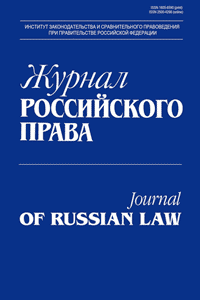The paper studies the problem of proving a criminal event, in particular, the time, place, method and other circumstances of a crime. The study covers law enforcement bodies’ practice, applied in procedural documents to describe any evidence of a crime by using such phrases as “at unknown time”, “from an unidentified person”, “under unclear circumstances”, etc. The author analyzes legal positions of the Supreme Court of the Russian Federation concerning the absence of proof for an event or a crime, and concludes that it is only after all and every effort to establish the circumstances of a crime has been made, if it is impossible to positively identify some of them without doubt, that an interrogator, investigator, prosecutor or court can make an appropriate procedural decision. In all other cases, such circumstances shall not be considered proven.
Criminal proceedings, presumption of innocence, the right for defense, availability of evidence, proof of evidence, criminal event, time of a crime, scene of a crime, method of a crime, components of a crime.
1. Bozh´ev V. P. Vsestoronnost´, polnota, ob´´ektivnost´ issledovaniya obstoyatel´stv ugolovnogo dela. Izbrannye trudy. M., 2010.
2. Lazareva V. A. Dokazyvanie v ugolovnom protsesse. M., 2009.
3. Mikhaylovskaya I. B. Nastol´naya kniga sud´i po dokazyvaniyu v ugolovnom protsesse. M., 2006.
4. Orlov Yu. K. Problemy teorii dokazatel´stv v ugolovnom protsesse. M., 2009.
5. Reznik G. M. Vnutrennee ubezhdenie pri otsenke dokazatel´stv. M., 1977.
6. Teoriya dokazatel´stv v sovetskom ugolovnom protsesse / pod red. N. V. Zhogina. 2-e izd. M., 1973.
7. Ul´yanova L. T. Predmet dokazyvaniya i dokazatel´stva v ugolovnom protsesse Rossii. M., 2008.
8. Sheyfer S. A. Dokazatel´stva i dokazyvanie po ugolovnym delam: problemy teorii i pravovogo regulirovaniya. M., 2008.








